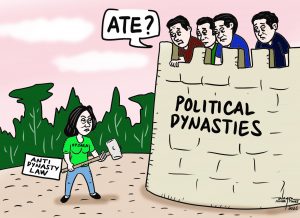There is such a familiar way of fishing. This is the one using hook, line and sinker. The most important element of course is the bait attached to the hook. It is the invitation for the fish to eat without knowing the danger lurking in it. As always, the temptation is beyond rejection. Thus, the fish is caught through its mouth.
We are reminded of this all too familiar adage when Davao City Mayor Sebastian “Baste” Duterte made a grim warning to people engaged in illegal drugs dealing in the city. He made his bold statement in his speech during the turn-over of command at the Davao City Police Office (DCPO) late last week.
The young Duterte in his sppech warned drug dealers to “leave the city (Davao) unless they want to be killed.” In the Visayan dialect “Kung di mo mohawa, di mo moundang patyon ta mo.”
Actually we have no problem with that, In fact we are happy that another era of a drug-free Davao City could be dawning. But we would have appreciated the young mayor more had he said it in a not so crime-laced language and at the same time detaching his person from the statement.
Say, “kung di mo mohawa, di mo moundang, patyon ta mo” is extremely brutal and personal than saying “if you will not stop, you will not leave (the City) you will suffer the serious consequence of violating the law.” Certainly as mayor he has the authority to create strategies on how he would want the “consequence” to happen.
A day after the mayor issued his warning three persons reportedly into drug dealing ended up dead after they allegedly shot it out with policemen conducted drug bust operations. The incidents might be coincidental with the issuance of the grim warning by Mayor Baste. But certainly the killing is one invitation to the human rights violation watchers to look into the killings. More so now that the human rights advocate groups have acquired a strong ally in their cause in the International Criminal Court (ICC) now looking intently into Mayor Baste’s father’s war on drugs.
Again, we must admit that the illegal drugs proliferation is gnawing on the fiber of society not just in Davao City but in the entire country. The only way to deal with it with noticeable success is by playing the game of those who are making the drug-related crimes prevalent. “An eye for an eye; or a tooth for a tooth.” But it can be said in a generic way. That is, detaching oneself from the action or actions taken and instead make it a concern of the law.
Now we will be waiting as to where the mayor’s “patyon ta mo” warning bring him and Davao City to. “Let us to see.”
************************
So, the street lights from Matina bridge down to Talomo have not been functioning for sometime already? That this non-lighting has already reached the attention of the members of the City Council who are now apprehensive of its consequences on the safety and security of people residing in the areas concerned?
But is not the street lighting a joint project of Davao City and Davao Light and Power Co.? How come the City Lawmaking body is calling instead the attention of the Department of Public Works and Highways (DPWH)? Has the national government agency a separate street lighting project that it has entered into with Davao Light. Which one, those on the roadside or those installed in center islands of the national highway?
According to DPWH spokesman Dean Ortiz the reason behind the frequent non-functioning of the street lights in the mentioned road stretches is that the wires connecting to the lamps are often stolen. The robbers reportedly burn the rubber insulators to extract either the copper or bronze wires inside and sell the same.
Stealing the wires though is indeed a dangerous trade. But it is worth the crime as the bronze or copper wire inside is costly on a per kilo basis.
The Council though could have done a better job had it also called a representative of the local electric distribution company to confirm the claim of the DPWH guy. Had it been done the local lawmaking body could have come up with recommendations on how the problem should be addressed. Or would the Council call Davao Light separately to shed light on the DPWH’s claim?



